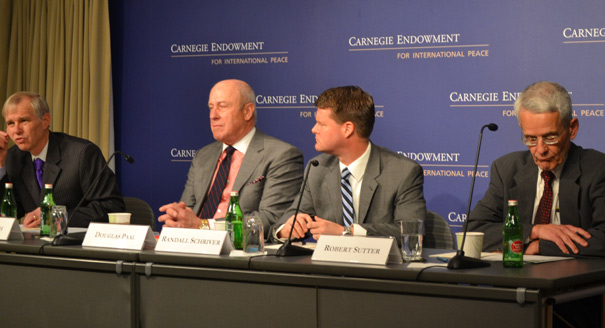Registration
Thank you!
You will receive an email confirming your registration.
As Taiwan peacefully manages its differences with mainland China, it seeks dignity within the international system and believes it can play a positive role supporting its close unofficial relationship with the United States.
On April 15, Taiwan’s President Ma Ying-jeou is set to address the United States by video conference during an event hosted by Condoleezza Rice at Stanford University. Richard Bush of the Brookings Institution, Randall Schriver of Armitage International, and Robert Sutter of George Washington University joined Carnegie’s Douglas H. Paal to review President Ma’s remarks and provide insight into the future of the U.S.-Taiwan relationship.
Cross-strait Rapprochement
- Achievements: Bush noted that both Taiwan and mainland China have put effort into building trust, regardless of their sovereignty issue. In particular, Taiwan’s approach to diplomacy, tackling easy matters before difficult ones and economic matters before political ones, has generated positive results, stated Schriver. At the same time, Ma’s speech also represents a brake on movements toward cross-strait reunification, added Bush.
- Challenges: According to Sutter, Beijing’s emerging pattern of increased assertiveness on sovereignty and territory issues with its neighbors can pose a serious hurdle. Taiwan should get ready for a China that is determined to be tougher on its Taiwan policy, he warned. For example, while President Ma has not expressed interest in political talks with mainland China, Beijing has been increasingly eager to lock in some concrete progress by the end of Ma’s presidency, added Schriver. Furthermore, military buildup in China has not retreated despite the successful signing of eighteen agreements between the two sides. This has the potential to be a stumbling block in cross-strait relations, Schriver warned.
A Self-Aware Identity
- Taiwan: According to Bush, President Ma’s administration has demonstrated strong commitment to liberal values in democracy. Sutter agreed, stating that Taiwan has also maintained a high self-awareness of its image as a responsible stakeholder in foreign policy. Thus, Taiwan’s democratic system has evolved and become a stabilizing force.
- China: On the other hand, identity self-awareness is lacking in mainland China, contended Sutter. Its leadership is influenced by the opinions of the elites and general public, who do not necessarily recognize Beijing’s mistakes in foreign policy. President Ma should be prepared to factor this issue into his cross-strait strategy, Sutter added.
Taiwan-U.S. Cooperation
- A Greater Role: Schriver urged Washington to aim for a more ambitious vision in terms of trade and security cooperation with Taiwan. In particular, he argued that Washington should not treat Taipei as a subset of the U.S.-China bilateral relation, since Taiwan can be constructive in regional issues beyond cross-strait, such as the Korean peninsula, East China Sea Peace Initiative, and fishery agreements.
- Conflict Resolution: In particular, Taiwan’s bilateral fishery agreement with Japan can serve as an example of a resolution that has potential to reduce the heat in Asia’s maritime disputes, Paal stated. Thus, the United States should try to harvest more from Taiwan’s diplomacy. Paal suggested that Washington could encourage a process leading to getting claimant countries to manage fish stock and work out no-fishing zones and seasonal fishing agreements.
